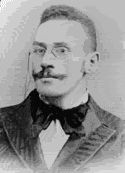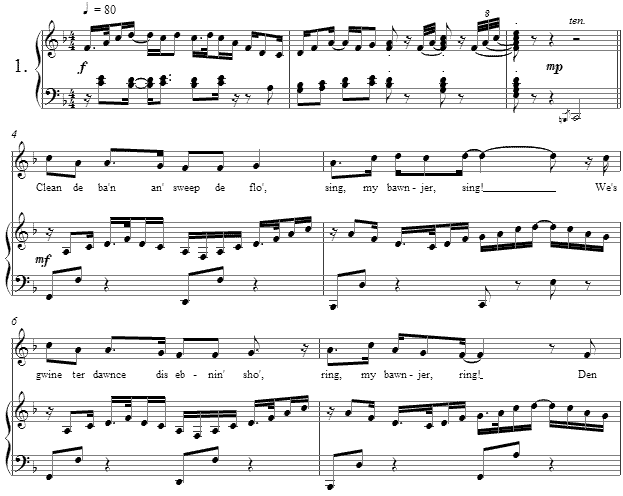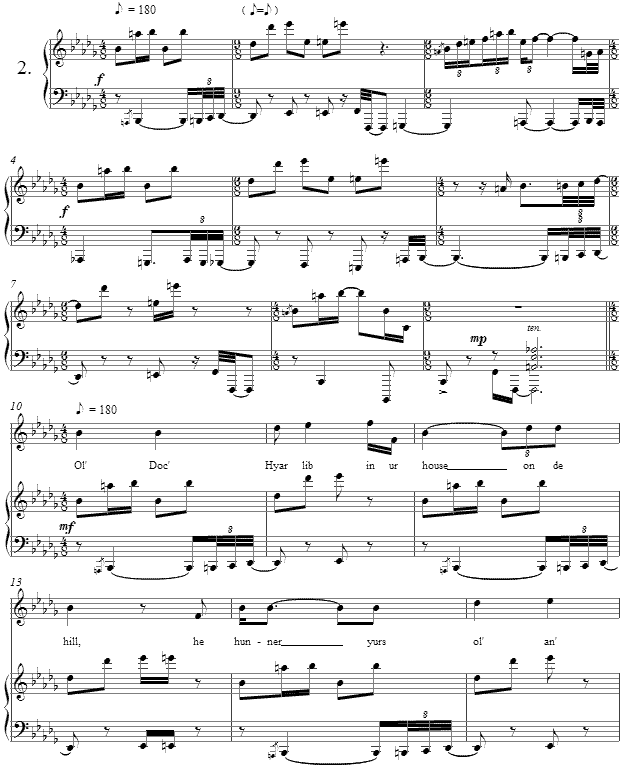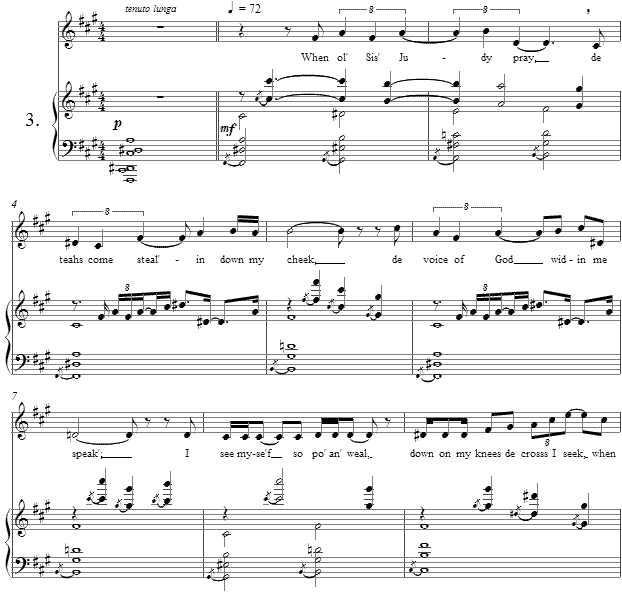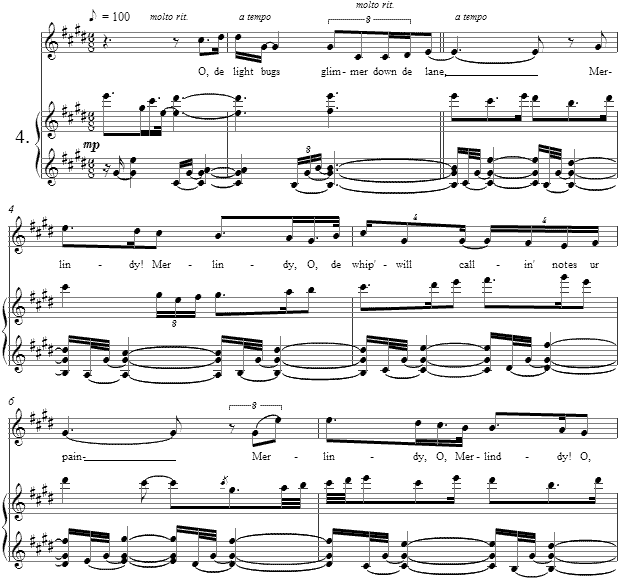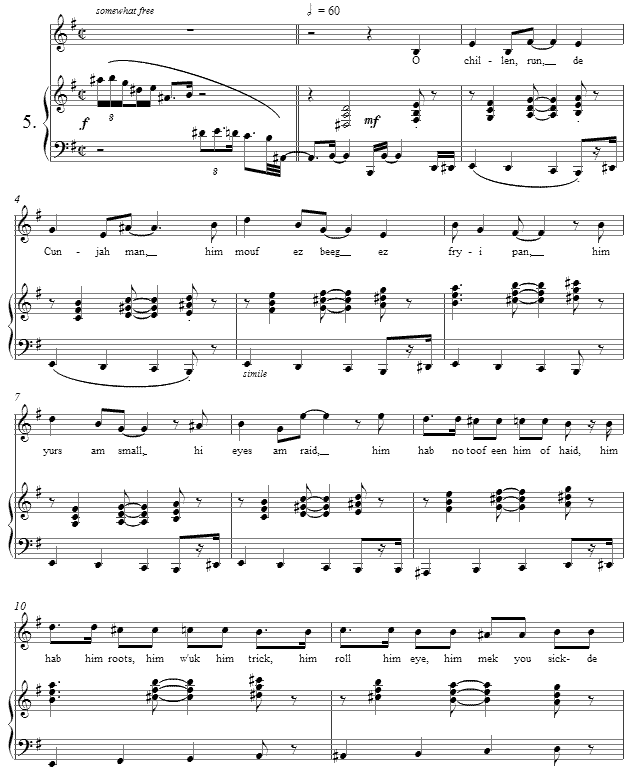Music and Texts of GARY BACHLUND Vocal Music | Piano | Organ | Chamber Music | Orchestral | Articles and Commentary | Poems and Stories | Miscellany | FAQs |
Echoes from the Cabin - (2006)

James Edwin CampbellFive songs for high or medium voice and piano
i. Uncle Eph's Banjo Song [ 3 pages, 1' 20" ]
Clean de ba’n an’ sweep de flo’,
Sing, my bawnjer, sing!
We’s gwine ter dawnce dis eb’nin’ sho’,
Ring, my bawnjer, ring!
Den hits up de road an’ down de lane,
Hurry, niggah, you miss de train;
De yaller gal she dawnce so neat,
De yaller gal she look so sweet,
Ring, my bawnjer, ring!
De moon come up, de sun go down,
Sing, my bawnjer, sing!
De niggahs am all come f’um town,
Ring, my bawnjer, ring!
Den hits roun’ de hill an’ froo de fiel’—
Lookout dar, niggah, doan’ you steal!
De milyuns on dem vines am green,
De moon am bright, O you’ll be seen,
Ring, my bawnjer, ring!
ii. Ol' Doc' Hyar [ 13 pages, 4' 35" ]
Ur ol’ Hyar lib in ur house on de hill,
He hunner yurs ol’ an’ nebber wuz ill;
He yurs dee so long an’ he eyes so beeg,
An’ he laigs so spry dat he dawnce ur jeeg;
He lib so long dat he know ebbry tings
’Bout de beas’ses dat walks an’ de bu’ds dat sings—
Dis Ol’ Doc’ Hyar,
Whar lib up dar
Een ur mighty fine house on ur mighty high hill.
He doctah fur all de beas’ses an’ bu’ds—
He put on he specs an’ he use beeg wu’ds,
He feel dee pu’s’ den he look mighty wise,
He pull out he watch an’ he shet bofe eyes;
He grab up he hat an’ grab up he cane,
Den—“blam!” go de do’—he gone lak de train,
Dis Ol’ Doc’ Hyar,
Whar lib up dar
Een ur mighty fine house on ur mighty high hill.
Mistah Ba’r fall sick—dee sont fur Doc’ Hyar,
“O, Doctah, come queeck, an’ see Mr. B’ar;
He mighty nigh daid des sho’ ez you b’on!”
“Too much ur young peeg, too much ur green co’n,”
Ez he put on he hat, said Ol’ Doc’ Hyar;
“I’ll tek ’long meh lawnce, an’ lawnce Mistah B’ar,”
Said Ol’ Doc’ Hyar,
Whar lib up dar
Een ur mighty fine house on ur mighty high hill.
Mistah B’ar he groaned, Mistah B’ar he growled,
W’ile de ol’ Miss B’ar an’ de chillen howled;
Doctah Hyar tuk out he sha’p li’l lawnce,
An’ pyu’ced Mistah B’ar twel he med him prawnce
Den grab up he hat an’ grab up he cane
“Blam!” go de do’ an’ he gone lak de train,
Dis Ol’ Doc’ Hyar,
Whar lib up dar
Een ur mighty fine house on ur mighty high hill.
But de vay naix day Mistah B’ar he daid;
Wen dee tell Doc’ Hyar, he des scratch he haid:
“Ef pahsons git well ur pahsons git wu’s,
Money got ter come een de Ol’ Hyar’s pu’s;
Not wut folkses does, but fur wut dee know
Does de folkses git paid”—an’ Hyar larfed low,
Dis sma’t Ol’ Hyar,
Whar lib up dar
Een de mighty fine house on de mighty high hill!
iii. When Ol’ Sis’ Judy Pray [ 7 pages, 3' 30" ]
When ol’ Sis’ Judy pray,
De teahs come stealin’ down my cheek,
De voice ur God widin me speak’;
I see myse’f so po’ an’ weak,
Down on my knees de cross I seek,
When ol’ Sis’ Judy pray.
When ol’ Sis’ Judy pray,
De thun’ers ur Mount Sin-a-i
Comes rushin’ down f’um up on high—
De Debbil tu’n his back an’ fly
While sinnahs loud fur pa’don cry,
When ol’ Sis’ Judy pray.
When ol’ Sis’ Judy pray,
Ha’d sinnahs trimble in dey seat
Ter hyuh huh voice in sorro ’peat
(While all de chu’ch des sob an’ weep)
“O Shepa’d, dese, dy po’ los’ sheep!”
When ol’ Sis’ Judy pray.
When ol’ Sis’ Judy pray,
De whole house hit des rock an’ moan
Ter see huh teahs an’ hyuh huh groan;
Dar’s somepin’ in Sis’ Judy’s tone
Dat melt all ha’ts dough med ur stone
When ol’ Sis’ Judy pray.
When ol’ Sis’ Judy pray,
Salvation’s light comes pourin’ down—
Hit fill de chu’ch an’ all de town—
Why, angels’ robes go rustlin’ ’roun’,
An’ hebben on de Yurf am foun’,
When ol’ Sis’ Judy pray.
When ol’ Sis’ Judy pray,
My soul go sweepin’ up on wings,
An’ loud de chu’ch wid “Glory!” rings,
An’ wide de gates ur Jahsper swings
Twel you hyuh ha’ps wid golding strings,
When ol’ Sis’ Judy pray.
iv. Negro Serenade [ 4 pages, 2' 20" ]
O, de light-bugs glimmer down de lane,
Merlindy! Merlindy!
O, de whip’-will callin’ notes ur pain—
Merlindy, O, Merlindy!
O, honey lub, my turkle dub,
Doan’ you hyuh my bawnjer ringin’,
While de night-dew falls an’ de ho’n owl calls
By de of ba’n gate Ise singin’.
O, Miss ’Lindy, doan’ you hyuh me, chil’,
Merlindy! Merlindy!
My lub fur you des dribe me wil’—
Merlindy, O, Merlindy!
I’ll sing dis night twel broad day-light,
Ur bu’s’ my froat wid tryin’,
’Less you come down, Miss ’Lindy Brown,
An’ stops dis ha’t f’um sighin’!
v. De Cunjah man [ 6 pages, 2' 20" ]
O chillen, run, de Cunjah man,
Him mouf ez beeg ez fryi pan,
Him yurs am small, hi eyes am raid,
Him hab no toof een him of haid,
Him hab him roots, him wu’k him trick,
Him roll him eye, him mek you sick—
De Cunjah man, de Cunjah man,
O chillen, run, de Cunjah man!
Him hab ur ball ob raid, raid ha’r,
Him hide it un’ de kitchen sta’r,
Mam Jude huh pars urlong dat way,
An’ now huh hab ur snaik, de say.
Him wrop ur ioun’ huh buddy tight,
Huh eyes pop out, ur orful sight—
De Cunjah man, de Cunjah man,
O chillen, run, de Cunjah man!
Miss Jane, huh dribe him f’um huh do’,
An’ now huh hens woan’ lay no mo’;
De Jussey cow huh done fall sick,
Hit all done by de Cunjah trick.
Him put ur root un’ ’Lijah’s baid,
An’ now de man he sho’ am daid—
De Cunjah man, de Cunjah man,
O chillen, run, de Cunjah man!
Me see him stan’ de yudder night
Right een de road een white moon-light;
Him toss him arms, him whirl him ’roun’,
Him stomp him foot urpon de groun’;
De snaiks come crawlin’, one by one,
Me hyuh um hiss, me break an’ run—
De Cunjah man, de Cunjah man,
O chillen, run, de Cunjah man![ 35 pages with cover and notes, total duration circa 14' 05" ]
James Edwin Campbell
James Edwin Campbell (1867-1896) was an black American poet, editor, short story writer and educator. He was born in 1867 in Pomeroy, Ohio, and died there in 1896. According to James Weldon Johnson, there is little known about his early life, which he kept shielded even from his closest associates. He attended public schools in Pomeroy and spent time at Miami College and wrote regularly for daily newspapers in Chicago in the 1880s and 1890s. Campbell participated in a group publication, the Four O’Clock Magazine, a literary magazine that was quite popular for a time, and was also President of West Virginia Colored Institute, which is now West Virginia State College.
He is known for his Driftings and Gleanings, published in 1887, and Echoes from the Cabin and Elsewhere, published in 1895 by Donohue & Henneberry, Chicago. These poems were republished in a collection, The Book of American Negro Poetry: chosen and edited, with an essay on the Negro’s creative genius, by James Weldon Johnson, Harcourt, Brace and Company, 1922.
If Johnson's challenge as suggested below is to be believed and if Campbell's wonderful poems are to live in such songs as mine and hopefully others, then the social stigma of this word must be set aside for a time, and the verse be allowed its own weight and value in our time. Else the art of this poet is of lesser value in the great scheme of things, and that would be a mistake. I hope therefore that the words remain intact in performance, as a representation of the time and culture in which they were freely used, in no sense pejorative but rather a social marker for one community distinguished from another.
The following is excerpted from James Johnson's Preface to the 1922 collection of poetry which he edited, and in which he wrote the forward titled, "The Negro's Creative Genius."
The status of the Negro in the United States is more a question of national mental attitude toward the race than of actual conditions. And nothing will do more to change that mental attitude and raise his status than a demonstration of intellectual parity by the Negro through the production of literature and art.
Is there likelihood that the American Negro will be able to do this? There is, for the good reason that he possesses the innate powers. He has the emotional endowment, the originality and artistic conception, and, what is more important, the power of creating that which has universal appeal and influence.
I make here what may appear to be a more startling statement by saying that the Negro has already proved the possession of these powers by being the creator of the only things artistic that have yet sprung from American soil and been universally acknowledged as distinctive American products.Given the notion that Campbell's verse are part of that which has "sprung from American soil," these texts and songs settings are meant as one expression of America, in which cultures live together and compliment one another. Campbell's poems are written in the dialect of his subjects, or the vernacular of the time, as well as standard English. The use of the now seemingly forbidden word, "niggah," is found in one of Campbell's poems which I chose to set. Its use was a product of the time, and not used in a pejorative manner, but rather to capture the flavor of a specific time and culture in his verse. Its place in Campbell's poetry in general and this song cycle specifically is apt, right and should not be deemed offensive for the following reason.
In setting these poems, I personally place such verse on a par with the verse which I have employed for other songs settings, written by some of the world's acknowledged greats in literature. Those who may wish to disagree with this view would do well to recall that Ira Gershwin's lyrics for the seminal "Porgy and Bess" are written by an American Jewish lyricist, as were the lyrics by Oscar Hammerstein for "Showboat." Those texts are not true "black" texts in any sense other than the use to which they are put in telling a story; one could argue the libretti and song lyrics are in fact "white." The argument is furthered by observing Verdi's Otello and Puccini's Madama Butterfly and Turandot, as by considering the role of Mao in Adam's Nixon in China. The argument is furthered even more by considering Samuel Coleridge-Taylor settings of Whitman and Browning or Ulysses Kay's settings of Dickinson and Crane. Which racial and cultural definitions apply or should apply? My conclusion is simple: none. Any such argument for race in music is surely nonsense in the long run, as such arguments tend to be.
These texts which I chose to set are by a true black American poet, and his choice of this particular vernacular was included without prejudice or censorship in Johnson's fine edition, publishing the work of many black American poets. Any urge towards trends in political correctness needs be set aside in favor of the poetical art of James Edwin Campbell, such that his voice is neither censored nor ridiculed. To do so would be an injustice to the art of this very original American poet, who meant by his work that the flavor and dialect of that part of the whole American tapestry which is our joint culture should not fade away, but be remembered -- and, in fact, I suggest it should be celebrated. [ 1 ]
The opening song is a simple hymn structure of two identical strophes, the accompaniment meant to "echo" a bit of banjo "picking." The melody is simple and straightforward, with a hint of syncopation.
"Ol' Doc Hyar" begins with a blues-like yet classically leaning opening gambit, shown in its changing meter and simple two part writing. The poem's several strophes are ordered with the first two complete with the repeating "cut time" refrain, while the following strophes, with the refrain tagged on, tell the tragedy of Mister B'ar under the medical care of the "hunner yurs ol'" physician. The lesson of the poem, as with today's modern world, is that the physician gets paid whether or not the patient dies. Therefore, I chose to repeat the word at the end of the last repetition of the refrain, "Money, money, money, money, money, money!" Things seem not to have changed much since Campbell's time.
The third song in the cycle is a recollection of that powerful and admirable black woman at the center of a vibrant church community, whom Campbell names "Ol' Sis Judy." Also strophic, the setting captures the first two verses of the poem with a chordal setting, the next two with a more up-tempo two-voice counterpoint, and then a return to the first texture for the last two verses with an extended focus on the church ringing loud with shouts of "Glory!" to which, though it does not appear in the poem itself, to capture the fervor of church praying I add "Hallelujah!" The seemingly improvisatory accompaniment figures are repetitious for each word cue, yet jazzy.
The fourth poem, "Negro Serenade," is a sweet 6/8 love song meant to woo one Merlindy Brown. The accompaniment of arpeggiated chords recalls the banjo song which opened the cycle. Note that here Campbell uses the proper term "Negro" in his title, whereas in the body of "Uncle Eph's Banjo Song" the dialect of the time speaks the word in Campbell's spelling, "niggah." This implies to me the clear awareness that the words have differing uses. "Negro" being a proper term, and "niggah" being the patois by which Campbell captures the era, sense of place and culture.
The last song, also strophic, tells the fantastic story of the Conjurer, or in Campbell's capture of the dialect, "De Cunjah Man." The accompaniment figure is sets of parallel fourths, just as those of which Hindemith and other 20th century composers were fond. In the context of E minor as a foil to the bass line, they play a standard harmonic function, as this chord structure figures often in jazz as well as classical styles of writing. The strophe's harmonic and textural elements are slightly twisted in the last the last verse, and the last shout and percussive cluster at the bottom of the piano keyboard place a final exclamation point on the setting as the cycle finishes, "Run!"
The score for Echoes from the Cabin is available as a free PDF download, though any major commercial performance or recording of the work is prohibited without prior arrangement with the poet and composer. Click on the graphic below for this piano-vocal score.
NOTES
[ 1 ] In a similar way, the mid- to late twentieth century has been a time of competing images of America's black community. In a fine biography, Hattie, the Life of Hattie McDaniel, (Madison Books, 1990) Carlton Jackson tells of the schism between black film actors, on the one hand, and the black activists of their era. From Chapter Six, pp. 95-96, titled "The Crusade Against 'Mammyism" comes this observation.
Two entertainers in the twentieth century rose to fame on one word: "Mammy." The first was Al Jolson, whose Mammy from Alabammy endeared him to
generations of theater goers. The other was Hattie McDaniel, whose portrayals of Mammy brought her to grief more than once. Jolson, of course, was white, and played in black face. His performances were related to the minstrel era, when black opposition to stereotypes was not strong enough to make an impact. Thus, white audiences -- and even black audiences -- continued to enjoy Jolson's acts.
By the mid-point of Hattie's career, the late thirties, things were changing. Black newspapers had grown in quantity, and many of their reporters were young, sophisticated, and educated, and would not follow what they considered to be the meek, fawning ways of their ancestors. The liberalism engendered by World War II furthered this feeling of black independence. Anything that smacked of "Uncle Tomism," or "Mammyism," came under attack by the black activists. The "Uncle Tom," actors like Ben Carter, Stepin Fetchit, and Clarence Muse, caught the brunt of the assault, as did Louise Beavers, Ethel Waters, and above all the others, Hattie McDaniel, for "Mammyism." Hattie was singled out for playing Mammy in Gone With the Wind, and the household servant who "yassired" and "yes'med" her way through 82 other attributed movies. The black attacks against her became so severe that at one time Hattie sadly proclaimed that her worst enemies were her own people.
I quote this and remember Ms. McDaniel because she served for years on the local election board with my own mother in our Los Angeles neighborhood.
That political activism came to attack such a fine artist was horrid, especially given the obvious history of black poets in the United States, as collected in James Weldon Johnson's The Book of American Negro Poetry (1922), who wrote in "the dialect."
Moreover, as history now places this era in some perspective, one notes that the later "black" rap and hip-hop culture with an emphasis on the so-called "gangsta" genre and its repeated use of the officially derided word, "nigger," proves that the political activism of the time as cited above was as much about sheer political power as opposed to a true stance about art.
The history of black Americans and their art includes so many strains that to deem some of them as politically incorrect is to again engage in that kind of attack which saddened Ms. McDaniel's later life and sullied her enormous accomplishment, all for the sake of personal political aggrandizement by some political activists who were motivated to attack blacks over supposedly "black" issues. The broad tapestry of black America includes so many strains that suppressing any facet of it is an attack on art itself for the sake of politics, something politics has done often, in many nations and many cultures.
Moreover, the initial goal of independence among American blacks is today become a return to the demand for dependence -- through a system of welfare support which smacks of everything except independence. For this, the current political dialogue has black progressives attacking black conservatives as a part of the tapestry of American politics.
What is certain as one examines the art of generations of poets is that from Campbell to Dunbar to Johnson to today, dialect and slang have been, are and will remain a part of the flavors of culture. The political flux will change again as have political winds shifted before, but the art will remain.
A final humorous anecdote from Jackson's book, p. 36, recalls advice given Ms. McDaniel by Bing Crosby:
When they knew each other better Crosby gave Hattie a "motto" that she liked to repeat to her friends: "Always remember this; there are only eighteen inches between a pat on the back, and a kick in the rump."
